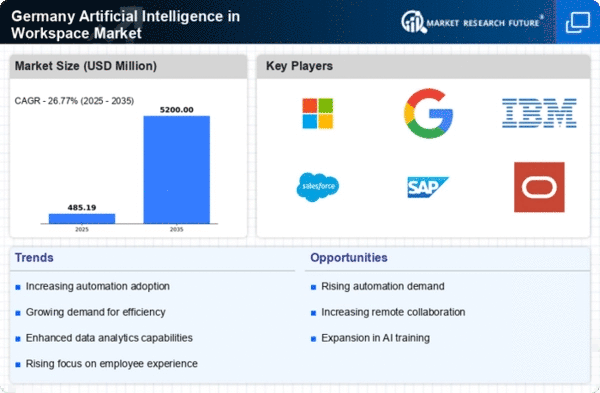Rising Demand for Efficiency
The artificial intelligence-in-workspace market in Germany is experiencing a notable surge in demand for efficiency across various sectors. Organizations are increasingly adopting AI technologies to streamline operations, reduce costs, and enhance productivity. According to recent data, companies that integrate AI solutions report an average efficiency increase of 30%. This trend is particularly evident in industries such as manufacturing and logistics, where AI-driven automation can significantly optimize workflows. As businesses strive to remain competitive, the push for efficiency is likely to drive further investments in AI technologies, thereby propelling the growth of the artificial intelligence-in-workspace market.
Emergence of Remote Work Solutions
The rise of remote work has significantly impacted the artificial intelligence-in-workspace market in Germany. As organizations adapt to flexible work arrangements, there is an increasing need for AI-driven tools that facilitate collaboration and communication among remote teams. AI technologies, such as virtual assistants and intelligent project management systems, are being integrated to enhance productivity in remote settings. Data suggests that companies utilizing AI solutions for remote work experience a 25% improvement in team collaboration. This shift towards remote work solutions is likely to continue influencing the artificial intelligence-in-workspace market, as businesses seek to optimize their operations in a changing work environment.
Focus on Data Security and Compliance
In the context of the artificial intelligence-in-workspace market, data security and compliance have emerged as paramount concerns for organizations in Germany. With the increasing reliance on AI technologies, businesses are prioritizing the protection of sensitive information and adherence to regulatory standards. The implementation of AI solutions that enhance data security measures is becoming essential, as companies seek to mitigate risks associated with data breaches. Recent statistics reveal that 60% of organizations consider compliance with data protection regulations a top priority when adopting AI technologies. This focus on security is likely to drive demand for AI solutions that ensure data integrity, thereby influencing the growth trajectory of the artificial intelligence-in-workspace market.
Integration of AI with Existing Systems
The integration of artificial intelligence technologies with existing systems is becoming a critical driver for the artificial intelligence-in-workspace market in Germany. Many organizations are seeking to enhance their current infrastructure by incorporating AI capabilities, which can lead to improved decision-making and operational effectiveness. A survey indicates that approximately 45% of German companies plan to invest in AI integration within the next year. This trend suggests a growing recognition of the potential benefits of AI, as businesses aim to leverage their existing resources while adopting innovative solutions. Consequently, this integration is expected to stimulate growth in the artificial intelligence-in-workspace market.
Investment in AI Research and Development
Investment in research and development (R&D) for artificial intelligence technologies is a crucial driver for the artificial intelligence-in-workspace market in Germany. The government and private sector are increasingly allocating resources to foster innovation in AI applications. Recent reports indicate that R&D spending in AI is projected to grow by 20% annually over the next five years. This investment is expected to lead to the development of advanced AI solutions that can address specific workplace challenges, thereby enhancing productivity and efficiency. As the landscape of AI continues to evolve, the commitment to R&D is likely to play a pivotal role in shaping the future of the artificial intelligence-in-workspace market.
















